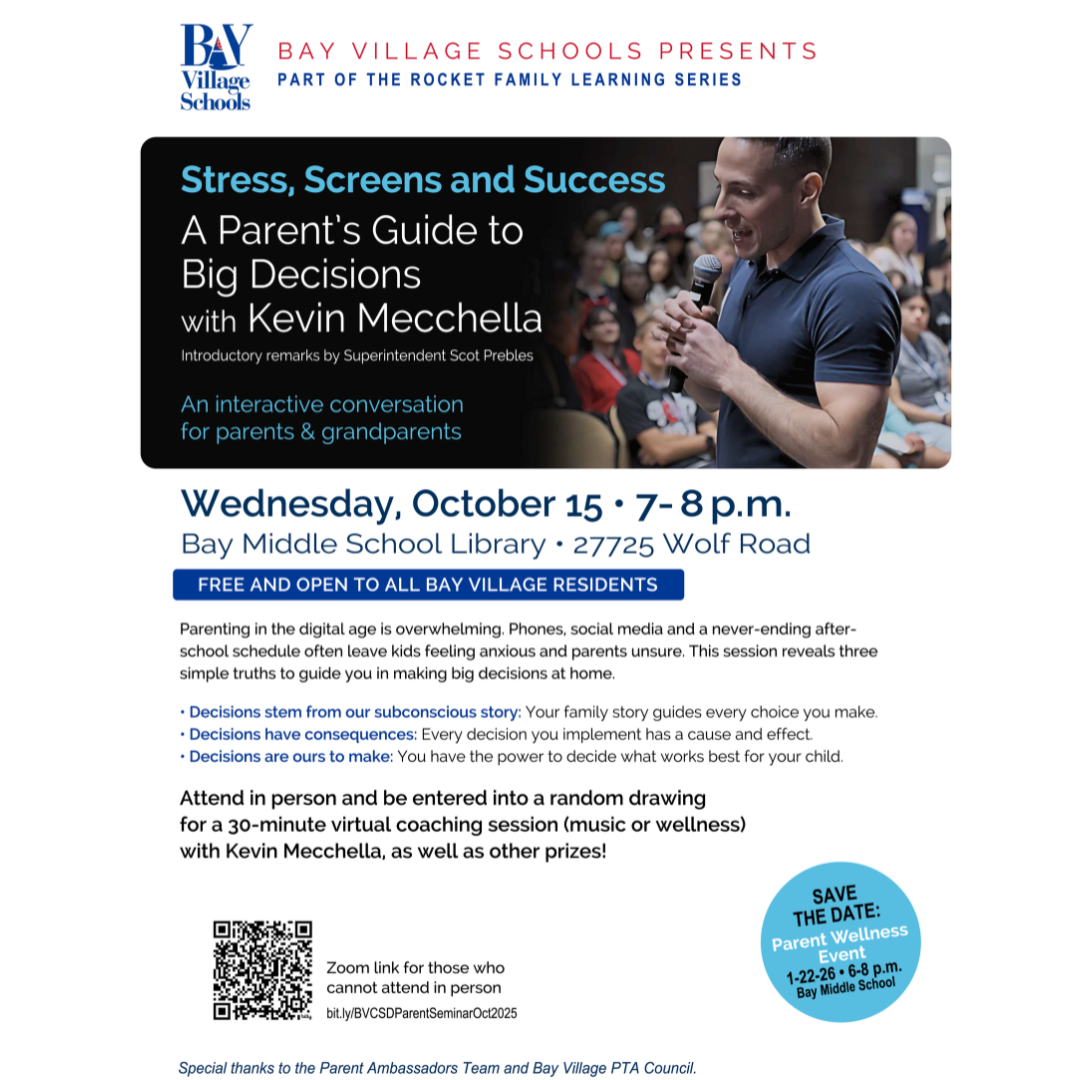
For the 2025-26 school year, Bay Village Schools will, for the second year, offer in-person parent seminars, and new this year, a parent wellness event is being coordinated for January 22, 2026 at Bay Middle School. Topics and ideas are brought forward by the district's Parent Ambassadors Team, the ad hoc Seminar Team and PTA Council. These events are open to all Bay Village residents.



For the 2023-24 school year, Bay Village Schools introduces a new feature: Tips for Parents from the Superintendent. These tips will be included in the last Principal Update of each month.
Supt. Scot Prebles hopes you find these tips useful as the district continues to partner with families to communicate information on topics like absenteeism, anxiety and digital safety. Each monthly tip will be chronicled so you can refer back throughout the year.
If you have a topic idea or feedback about this new feature, please share your thoughts.
• August 2023 Tip for Parents
Did you know that absenteeism in the first month of school can lead to poor attendance throughout the school year? Half the students who miss 2 to 4 days in September go on to miss nearly a month of school.
• September 2023 Tip for Parents
Did you know that school refusal occurs in 1-7% of youth in general populations? Here are some warning signs:
Showing distress, tantrums, or crying in the morning before school.
Difficulty getting your child out of bed without a lot of cajoling.
Refusing to get out of the car at drop-off.
Starting to miss school with some frequency or pattern.
Starting to have problems doing school work in class or at home (which can lead to school avoidance).
Texts to pick up your child from school during the day.
• October 2023 Tip for Parents
While attending school functions where parents are present, as well as during walks in Bay Village with my wife, Leah, parents ask me about digital awareness and safety. Issues like these are important to parents, teachers, administrators and community members. Together we all wish to keep our children safe. As such, I ask that you review a few facts about internet safety presented below, and when you have a moment, take a look at the additional information in the links provided.
General Internet Safety Facts:
About 1 in 7 children have been contacted by an online predator.
By age 11, most kids have seen inappropriate images/material online.
40% of kids/teens say they would behave differently online if they knew their parent was monitoring.
45% of kids/teens feel overwhelmed by drama on social networks, which impacts how they feel.
Additional resources are linked here: Protect Young Eyes, Common Sense Media, Teach-Wise Family, Glow Kids and Raising Humans in a Digital World.
Editor's Note: Save the Date! Student Online Safety Webinar: A Presentation for Bay Village Parents
Bay Village Schools’ month-long focus on cybersecurity and digital citizenship concludes with a Zoom webinar for district families on Thursday, November 16 at 7 p.m. Please plan to attend this important event to keep your students safe in a digital world. Register via this link.
• November 2023 Tip for Parents
Did you know that Bay Village Schools has a 24/7 Tipline that can be accessed by phone, text or email? Anyone can share concerns about student or school safety. Please click here to find out more about our SpeakUp for Safety Tipline or to share a tip.
Text or Call: 440-517-6160 Email: speakup@bayk12.org
Additional Resource: Ohio School Safety Center
• December 2023 Tip for Parents
More people find their stress increases rather than decreases during the holiday season for a variety of reasons.
1 in 6 parents report high stress levels during the holidays.
1 in 5 parents say their stress level negatively affects their child’s enjoyment over the holidays.
1 in 3 parents are relieved when their child goes back to school after the holiday break.
Additional resources on this topic can be found here, here and here.
Ways to prevent holiday stress for your children
• January 2024 Tip for Parents
Finding Joy and Energy in the New Year: Hit the Reset Button!
When we ask parents what they want for their kids, they usually reply with . . .”I want them to be happy!” Extensive research shows there is an established link between happy and successful parents with happy and successful kids.
Teach them to build relationships: small acts of kindness can help build empathy.
Expect effort, not perfection.
Teach optimism.
Empathize, label and validate struggles/challenges.
Eat dinner together.
Additional resources on this topic can be found below: Raising Happiness; Good Parenting Skills: 7 Research Backed Ways to Raise Kids Right; How Can Parents Find Joy and Energy in the New Year?; 1-Minute Secret to Forming a New Habit; and Have Dinner Together
• February 2024 Tip for Parents
Healthy Sleep Habits
Why is sleep important? Children and teens need sleep to:
Pay attention and learn in school.
Improve athletic performance.
Grow and develop normally.
Be healthy.
The American Academy of Sleep Medicine has recommended that children aged 6-12 years should sleep between 9-12 hours a night, and teenagers aged 13-18 years between 8-10 hours a night.
Additional resources on this topic can be found here: How can I get more Sleep?; How Much Sleep do I need?; Bedtime Battles; and The Promise of Sleep
• March 2024 Tip for Parents
Benefits of School-Family Partnerships
Through open communication and collaboration, parents and teachers create important opportunities for children and teens to develop social, emotional and academic skills.
• Ways to Get Involved
Here are 10 Suggestions for getting involved in your child’s education:
Attend back-to-school nights or other orientation events.
Ask your teacher how they would like to communicate.
Demonstrate a positive view of education at home.
Promote literacy by reading with your child.
Help manage and guide the homework process.
Attend school events.
Attend parent organization meetings.
Volunteer in the school.
Let the school know what groups, classes or guidance you would like to provide.
Encourage your child to participate in extra- and co-curricular school activities.
• Additional Resources
How to Help Teenagers Stay Motivated How to Help Your Child Get Motivated
• April 2024 Tip for Parents
May is Mental Health Awareness Month
Mental health issues can affect anyone. Every year during the month of May, the National Alliance on Mental Illness (NAMI), joins the national movement to raise awareness about mental health. With NAMI and our district mental health experts, we can fight stigma, provide support, educate the public and advocate for policies that support the millions of people in the U.S. affected by mental illness. Read on to learn statistics about mental health.
One in 5 American adults experience a mental health condition in a given year.
One in 6 young people have experienced a major depressive episode.
Half of all mental health disorders show first signs before a person turns 14, but only half of children and adolescents receive the treatment they need.
Additionally, suicide is a leading cause of death in the United States. In fact, it is the second leading cause of death for people ages 10-24. Suicide accounted for the loss of more than 45,979 American lives in 2020, nearly double the number of lives lost to homicide.
• Additional Resources
• May 2024 Tip for Parents
Purposeful Living this Summer Break
Summer break is a great time of year, but it can also mean a big adjustment. Here are some tips to help you navigate the phases of summer:
Have a game plan.
Keep a daily summer routine and share responsibilities.
Create down time.
Set screen time rules.
Plan family time.
To learn more about the different “phases of summer,” please click on this article.
Additional Resources
Strategies for a Successful Summer Break
How to Create a Summer Schedule
